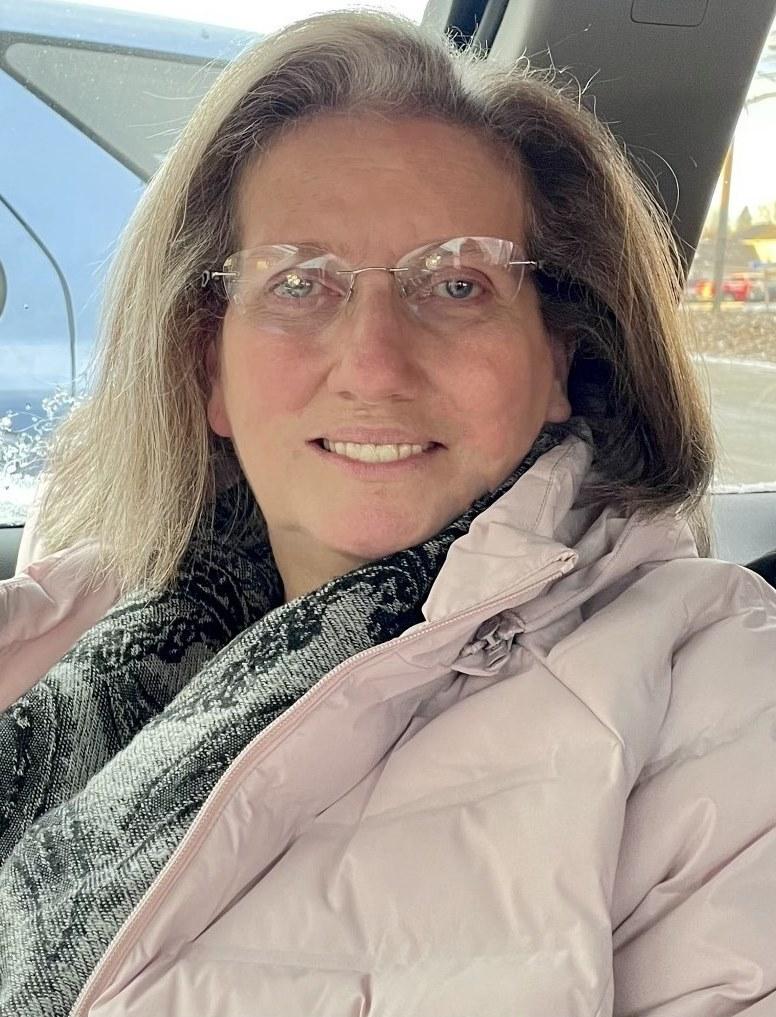Cahoon Care Associates, LLC. | |
Norwell, MA: (781) 659-1877
133 Washington St., Norwell, MA 02061
| |
Sandwich, MA: (774) 994-2212
71 Route 6A, Sandwich, MA 02563
| |
Ellsworth, ME: (207) 667-0870
| |
 | |
We're very pleased to present this quarter's Cahoon Care "Caregiver of the Quarter" recognition to Ruth Brittain.
We are delighted to recognize Ruth for her exceptional caregiving. Ruth has enjoyed a loving relationship with her husband of 34 years and is the proud mother of seven children: six sons and one daughter. Ruth enjoys the little downtime she has with her cat, May Day, and her dog, Baloo, who provides affection with his lovable hugs.
Caregiving runs deep for Ruth. Perhaps she inherited the passion from her mother who was a caregiver, or maybe the spark was ignited by caring for her father for 15 years. Ruth earned a bachelor's degree in Social Sciences and a master's degree in Health Care Administration. She soon realized her heart was that of a caregiver, and we are grateful her heart landed with Cahoon Care!
One client's family member contacted us to share how grateful they were for Ruth's ability to perform incredibly well in an exceptionally challenging and demanding situation. They commented on the skill, grace, and competence she demonstrated when coming into a stranger's home, and on her remarkable ability to blend in so seamlessly. The support and caring she provided for all involved were invaluable as the family navigated through an exceedingly challenging time.
Another family member emotionally described how the quality of her loved one's life had improved profoundly because of Ruth's care. She further shared her sense of relief that she no longer needs to be at her loved one's side as a caregiver; the shift to returning to simply being a family member has been an incredible gift.
Yet another family member described the frazzled state she and her family had been in when Ruth began to provide care for their loved one. Initially they had found it unsettling and a bit frightening to take that leap of faith of inviting a stranger into their home. Fortunately, Ruth stepped right in as if she had always been a part of the plan. They described Ruth as being amazing every step of the way. While the journey had been difficult, because of Ruth's care it became not only manageable but also peaceful.
It is clear to see the incredible impact Ruth has made on so many families. While it is never easy to choose just one caregiver to recognize, it is easy to see why Ruth has been acknowledged this quarter.
Thank you, Ruth, for all you do! In your humble words, you consider your work to be "just relating with your clients."
| Anniversary Celebrations! | |
We're celebrating some important employee anniversaries this quarter:
Sara Bartels - 11 years
Marie Nugent (CNA) - 7 years
Chelsea Curtis - 5 years
Sheila Eloi - 4 years
Ruth Brittain - 3 years
Jean Harrington - 3 years
Michelle Campbell - 3 years
Terry Bassett - 3 years
Catherine (Cathy) Watts (CNA/HHA) - 3 years
Pamela Jewers - 3 years
Billie Bates - 3 years
Wendy Hammond - 3 years
Paula Calkins - 2 years
Maryanne "Mimi" Matthes Lipman - 2 years
Macy Miles - 2 years
Mable Nelligan - 2 years
Arlene Eaton - 2 years
Cynthia Northrup - 2 years
Ashley Eisenhauer - 1 year
Kristina Straticoglu (CNA) - 1 year
Kathleen (Kate) Dahlquist - 1 year
Sheila Parenteau - 1 year
Anette Roberts (CNA) - 1 year
Jelfiline Rodrigues (HHA) - 1 year
Joan (Jo) Schofield - 1 year
Kimberly Murphy - 1 year
Ashley Gustafson - 1 year
| Hurtful Words and How Caregivers Can Cope |  |
|
It's no easy task to care for an individual suffering from Alzheimer's or dementia, but when that person starts using hurtful words to interact with you, the level of difficulty can quickly escalate. It's human nature to take rude or mean words personally and feel that the individual is consciously attacking you verbally. In the case of those living with a form of brain change, however, that's simply not true.
By understanding what's really going on in the person's brain, you'll be able to gain a much greater sense of tolerance, and learn how to respond to his or her behavior rather than react. It all comes down to realizing that the brain is undergoing significant changes as it declines due to disease. In particular, dementia affects the parts of the brain that produce language, enable you to express yourself, interpret threat perception, and control your impulses. Any one of these issues would cause personal interaction to be challenging, but combining all four can create a perfect storm.
As dementia progresses, the ability to produce language decreases. Interestingly, while lifelong vocabulary may begin to be lost, forbidden words (such as profanity, vulgarity, racial slurs, or insults) are often still retained by the brain.
Imagine, for instance, that a person suffering from dementia gets angry or distressed because you misplaced their glasses. S/he may no longer have the ability to communicate a complex sentence such as, "I really wish you didn't move my glasses because now I can't find them." Instead, what might come out is a derogatory term or insult, simply because that is the only language available at the time.
Read more on our blog...
| How to Handle Dementia Accusations |  | |
The brain of a person struggling with dementia can begin to link facts and details in unusual ways. As the brain starts to change, a false-memory phenomenon can begin to occur. This causes the individual to perceive reality differently than those around him or her, and can lead to hurtful behavior toward caregivers.
One common scenario experienced by caregivers of those with dementia is being falsely accused of things they didn't do, such as theft, mistreatment, poisoning, or keeping the individual prisoner.
Since those with dementia are typically no longer in control of their money, they may feel that a caregiver has stolen their cash. Since they can easily misplace things (like glasses or a TV remote control), they may think caregivers are stealing their belongings. When they are no longer the ones preparing their meals, they may suspiciously think their food or drink is poisoned. Since they are now more housebound than they used to be, it is easy to begin to feel they are being held hostage.
Learn more on our blog...
| We're pleased to announce that JoAnn Ashfaq, Annette Roberts, and Scarlet Stark received employee appreciation baskets for their outstanding service! | In preparation for mailing out our W-2s at year-end, we are asking all Cahoon Care caregivers to check in with our office to ensure your mailing address is up to date. This will help us avoid returns and delays. Thank you! | |
Wearing a mask continues to be a critical way to help prevent the spread of COVID-19.
The U.S. government is now providing free N95 masks for individuals. Free N95 masks are available to pick up at local pharmacies and community health center sites across the country. Every person is allowed up to three free masks, pending availability.
The CDC recommends you wear the most protective mask you can, and that it fits well over your nose, mouth, and chin.
| |
Find Out Who
Is Earning $$
Through Referrals!
| |
You may have heard our very own Allan Parker recently on the radio speak about the need for more wonderful caregivers such as you!
If you didn't, please click here and take a listen. Remember, we offer a $300 referral bonus. We know the best caregivers know the best caregivers! Please send them our way, and in turn, we'll send money your way.
Call Sheila at (207) 610-3280 in Maine, or Karen at (781) 635-4968 in Massachusetts with your referrals.
Below are recent referrals. Thank you to all who passed along a referral - and enjoy your referral payout!!
Scarlet Stark
(referred Sheila Watson)
| |
We're excited to announce 7 new members of the Cahoon Care team this past quarter...and some were referred by YOU:
Esther Antoine (HHA)
Kimberly Burr (CNA)
Sherley Etienne (CNA)
Tammie Goggin
Carole MacKay Hammond
Christina Peet
Sarah Pinkham
| PSA for Car Inspection Stickers | |
In case you missed it, starting this fall there will be a change to the way inspection stickers are given out in Massachusetts - and it affects those who wait too long to get their car inspected.
As of November 1, 2022, the RMV says that cars that pass the annually required inspection will get a new sticker with the month the last sticker expired, rather than the month of inspection. Any driver who waits more than a year will get a January sticker.
The goal of this change is to make sure cars get inspected each year.
Read more here.
| As the weather gets colder, we wanted to remind everyone that the elderly typically require their environment to be much warmer than what many of us generally feel is comfortable. As a caregiver, it's important to respect the temperature that is most comfortable to the client, even if it's not ideal for you! | Click on This Shell to Find Out if You're a Winner! | |
Click here to play this month's fun trivia game. The two individuals with the most correct answers are the winners. If there is more than a two-way tie, the winners are the first person and the last person (not more than 3 days after the newsletter was sent) to submit answers!
Last quarter's shell game winners were:
Amanda Brown
Paula Calkins
We hope you had fun playing and enjoyed your treat!
|
Caregiving is challenging work. Sometimes we all need to vent and get support. It's important to find an objective audience who is not as close to our experiences as we are, but who can still relate by experiencing similar situations.
If you are on Facebook, take a peek at this amazing support group. You never know - the message you need to hear may be shared there. You'll also have an opportunity to vent to people who will understand and embrace you with open arms.
Please don't forget, your team in the office at Cahoon Care is happy to help or be your sounding board.
| |
Video Tips:
Too Tired to Shower?
| |
It may not be a copout if someone with dementia says they're too tired to shower, or that it takes too much energy. Showering can require a tremendous amount of physical and/or mental exertion for some individuals.
Click here or on the video above to learn the best way to respond if someone says this to you. Be sure to tell him or her that you'll do all the work. Your best tool will be a transfer bench.
| Daily Senior Care Tip: 7 Tips to Get Someone with Dementia to Take a Bath |  | |
Bathing is a constant struggle for many caregivers of seniors with Alzheimer's, dementia, or other cognitive impairments.
It's definitely important to keep your older adult's body clean to prevent skin infections, reduce the risk of urinary tract infections, and avoid unpleasant body odor.
At the same time, trying to get seniors to take a bath or shower often results in arguments, hostility, crying, or screaming.
If this sounds like a common scenario to you, here are eight tips to help you overcome their resistance to bathing. Experiment to find out which of these works best for your older adult.
Click here for more information.
__________________
DailyCaring provides practical caregiving tips for everyday challenges even the most experienced caregivers face. We hope you enjoy the content (like the article above) as much as we do! Topics range from Alzheimer's/dementia tips to stress relief pointers.
Sign up for DailyCaring, a daily e-newsletter filled with helpful news you can use, and inspirational senior care tips! You can also follow the DailyCaring Facebook page.
|
 | |
|
We all understand COVID conversations are old, and wearing PPE is not comfortable or convenient for a variety of reasons. However, the use of PPE does protect you and those you encounter. Please do not lose sight of the fact the PPE policy is in place to protect you and your loved ones as much as it is to protect clients.
Recently a housebound client contracted COVID-19. A member of the care team working when the client received the positive test results expressed concern about contracting COVID and bringing it home to loved ones. A completely understandable reaction, especially because PPE was not worn 100% of the time while the caregiver was with the client.
This incident presented a timely opportunity to share the message below from Executive Director Jake Krilovich of the Massachusetts Home Care Alliance, emailed to Alliance members on September 29th.
| |
|
The CDC has modified its infection control recommendation which makes mask requirements optional for health care facilities and settings (including home health) in communities where transmission is not "high."
Currently, only one-quarter of the country has transmission below the "high" category. Massachusetts remains in the highest category of community transmission, and the Alliance has confirmed with MA-DPH that it is reviewing the revised CDC guidance. In the meantime, the current masking requirements for health care personnel (including home care and home health) remain in place.
The CDC's decision sparked immediate debate on whether the revision was premature given the nearly 50,000 new cases per day and 450 deaths per day nationwide. But public perception of COVID is at a low point, with Americans "concern for COVID-19 currently at 57 percent, down from around 80 percent last September."
Jake Krilovich, Executive Director
Home Care Alliance of Massachusetts
* * * * * *
| |
|
Your CCA office team is here to support you. If the client(s) you work with ask you not to wear your mask, please report it to the office at (781) 635-1877 so that we can intervene on your behalf.
Your dedication, skill, and caring make an immeasurably positive impact on our elderly population. Thank you!
Warmest regards,
Margery, Carolyn, Allan, Sara, Pippa, Brianna, and Karen
| | | | | |